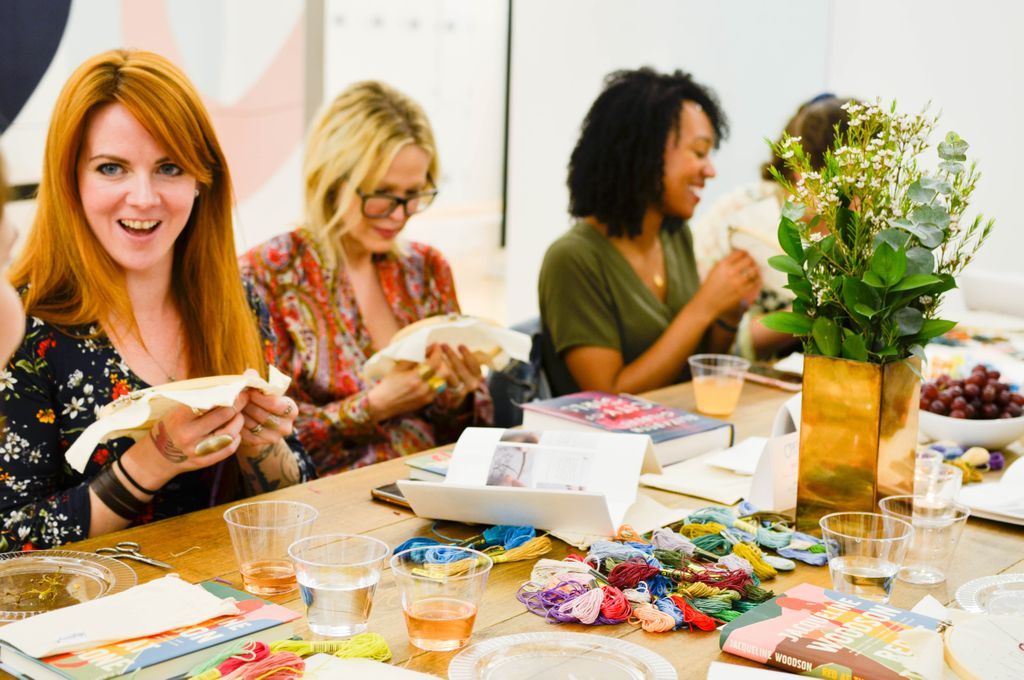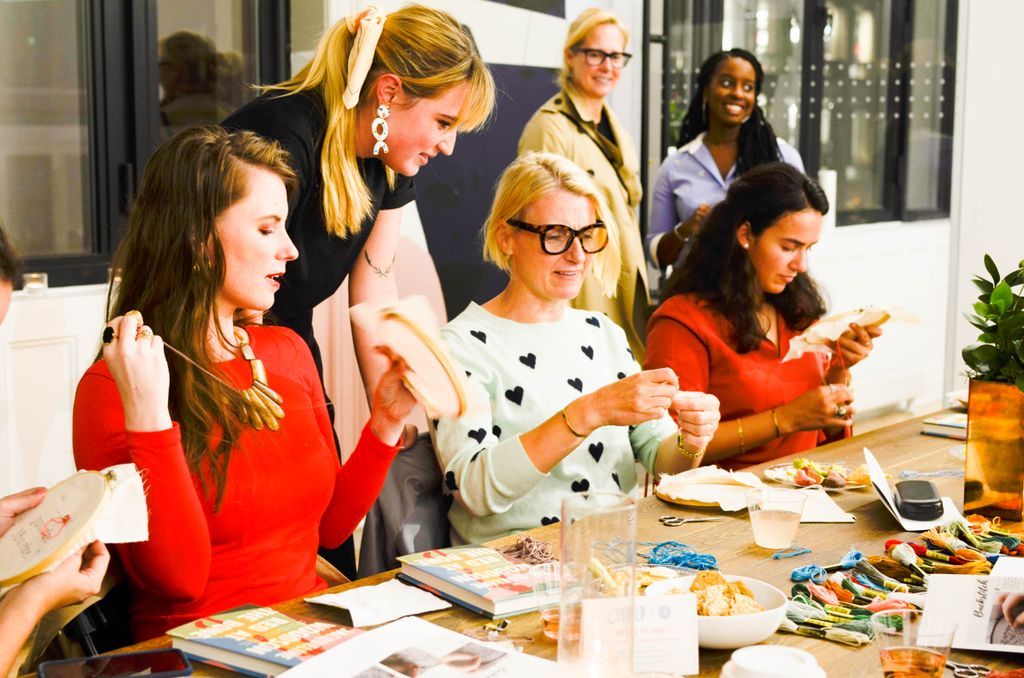“We’re putting a new spin on the classic ‘book club’ by pairing active discussion with active hands,” said Helen Berhanu, publicity assistant at Riverhead. Books on the agenda? Elizabeth Gilbert’s City of Girls and Jacqueline Woodson’s latest, Red at the Bone. Attendees received stitching patterns inspired by these texts, which were paired for their shared themes; both stories feature young women coming of age, discovering their sexuality, and growing into their own lives in New York City. Traditional book clubs are usually comprised of an in-group of friends or coworkers. My mom has been in one with women in her neighborhood for nearly two decades. To me, being invited to join a dedicated book club would feel a bit like being invited to join a secret society, one that involves book discussion, social activities, and most likely potluck-style snacks. Becoming a part of such a group is a social goal I aspire to but have not yet achieved. Traditional book events are often quite the opposite to book club. I’ve been to my fair share of readings since I moved to New York in 2018, but most of the time I go, sit alone, and leave. A reading is a presentation. Though it brings together a bunch of strangers with a shared interest, there’s usually little interaction. Give these people a reason to start talking to each other, though, and such events can become a jumping off point for community building. This happened to me when I attended the launch for Hank Green’s An Absolutely Remarkable Thing. Far from a traditional reading, the event was a multi-segment live show with comedy, a musical performance, a podcast taping, and a brief lecture on the themes of the book. But what made the night memorable was the pre-show slideshow, which included prompts to use as conversation starters with fellow audience members. I used one to strike up a conversation with my seat neighbor. Our chatting turned into an exchange of phone numbers and a plan to get together to discuss the book once we’d both read it. A year later, we’re still friends and hang out every few weeks. I helped her move into her new apartment. She came to my birthday party. (More on that story here.) Sip & Stitch was the love child of a book club and a book event. Anyone could buy a ticket, and because the event centered around an activity, it fostered low-pressure discussion among like-minded strangers. As many participants had not yet read the books, the event focused more on the bookish community atmosphere and the fun of crafting together. Elizabeth Gilbert herself made an appearance at CRAFTED x Riverhead, but not by design—in her own words, she invited herself. There was no reading or traditional signing line. She, too, was there to hang out, sew, and talk books.
A post shared by Elizabeth Gilbert (@elizabeth_gilbert_writer) on Oct 1, 2019 at 6:04am PDT “We’re all about trying to reimagine what a book club can be,” said Berhanu, “and making the reading experience as inclusive as possible by adding new access points for people who may not even have thought of themselves as ‘readers,’ per se.” Perhaps this nontraditional approach is the future of book events, a way to partner interests in order to bring more people in whether or not the author herself is present. For lesser-known or debut authors without the name recognition needed to draw a crowd, pairing activities with book promotion can be a way to fill a room. Hosting a cooking class or demonstration based on a cookbook is a natural example of making a book event hands-on. At the Texas Book Festival, attendees can find a number of demonstrations by cookbook authors under the Central Market Cooking Tent. Loyalty Bookstore in D.C. hosts a number of unique book events, including a literary cocktail series. Every weekend, local bartender Chantal Tseng prepares a menu of drinks inspired by a new book and serves them in a speakeasy the bookstore shares with the bar next door. Often, the chosen book pairs with a reading hosted earlier in the evening. Loyalty Bookstore also hosts author brunches, which give attendees a chance to hang out with an author over a boozy Saturday morning meal. Many bookstores, serving as community centers, also host book clubs that are open to the public. For those who don’t want to or can’t commit to a regular book club, places like The Bookshop in Nashville have a creative solution. They host a regular Lit Chat event, an informal gathering of readers that takes place in the coffee shop next door. Rather than discussing an individual book, attendees just talk about whatever they’re reading. The Bookshop also hosts a Silent Book Club, which is exactly what it sounds like—an opportunity to gather with others for no other purpose but to sit in silence and read together. Reading is a solitary activity but a communal interest. It can be incredibly personal while also being part of a collective experience, which is why I love events that bring readers together in community spaces. Some of the women I sat with at CRAFTED x Riverhead were friends who met through Bookstagram, then took an online friendship and made it IRL.
A post shared by Christine (she/her) (@christine_queenofbooks) on Oct 9, 2019 at 6:01am PDT I love the internet—the way it helps us gather and disseminate information and find virtual communities where we might not in our geographic ones. But I also love things that enable those online groups to move into offline spaces, to connect those disparate threads of our lives—stitch them together, if you will. And if you end up with a cool embroidery hoop afterward, all the better. Thank you to Riverhead Books for inviting me to Sip & Stitch! To find out about future CRAFTED x Riverhead events, be sure to follow Riverhead Books on their Facebook, Twitter, and Instagram.

